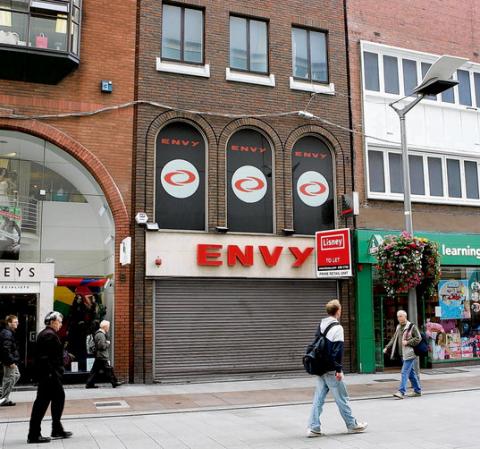Commercial rack rents persist despite new law

Despite a law change in January, upward-only rent reviews continue to affect tenants with leases signed prior to 1 March 2010. Struggling shopkeepers hoping for a rent review remedy will be kept waiting. By Sandy Hazel.
The Land and Conveyancing Law Reform Act 2009 includes a key provision which renders ineffective the traditional upward-only rent review clause. However, this does not apply to leases signed before the commencement of the Act.
The Government is reluctant to apply a downward provision to any lease negotiated before that date, citing constitutional and legal considerations.
(Pictured: A commercial premises lies vacant on Dublin's Henry Street)
According to David Fitzsimons of Retail Excellence Ireland, this has resulted is an absurd situation. "Currently there is over-availability in the commercial property market, there is under-demand for that property and yet we still have rents going up," he said.
In a collapsing rental market, landlords remain protected by an upward-only rent review measure. Landlords in Dundrum shopping centre seek increases in rent by as much as 60%. Rent increases
of 100% are sought at the Pavilion Shopping centre in Swords, and 46% at the Monahan Shopping Centre. In Cork the landlord of the Wilton Shopping Centre is looking for increases of between 36% and 58% from tenants who are struggling financially.
A bill proposed by Labour to create temporary relief to tenants with existing upward-only rent review was rejected last month. Labour spokesperson on Housing and Local Government Ciarán Lynch said: "Businesses can control wage costs and some energy costs, but they are locked in to upward-only rents which are benchmarked at boom rates."
The Government has set up a working group to examine commercial rent reviews in existing leases. This move, described by one industry insider as "a kick to touch by Dermot Ahern" has been shown particular disregard by the finance industry.
Chris Andrews, chair of the Joint Committee on Enterprise and Trade, which met to discuss this issue, was "flabbergasted" that asset management representatives from Bank of Ireland and AIB did not attend the meeting "on the very day" those institutions were bailed out by the Irish taxpayer. Others agree that there is little sense of urgency.
While the commercial rental arena in Ireland is not exactly a market – it has skewed arbitration process, little transparency in negotiations and secretive confidentiality clauses – there was a supply and demand element which resulted in high rents.
Capital values of premises on Dublin’s streets were inflated partly due to ‘key money’ according to John Corcoran, head of the Grafton Street Traders Association. "This key money was paid by tenants on moving in," said Corcoran. "Key money was also paid by the landlord to get tenants out."
Now tenants are faced with the prospect of paying key money in order to leave a lease they cannot afford anymore. One business owner has offered €350,000 to anyone willing to buy his lease.
The argument coming from the landlords is that no-one forces a tenant to stay and that the tenant doesn’t have to accept the terms.
There is opinion that the legislation change is making investment in property in Ireland a bad move. Yet much of Europe has similar downward rent reviews. There are arguments for and against index linked rents and shorter terms – the upward-only rent review clause was originally established to give the tenant longer leaseholds and more security.
Yet index-linked rent seems to work in other countries. So what is the problem in Ireland? Greed is the general response. John Corcoran said that rates are linked in to property values and this is an added burden on retailers. David Fitzsimons said that there needs to be a “dual solution to ridiculously high rents which are untenable”. He suggested a legislative change which will work retrospectively to help existing leaseholders. “But more importantly is the reform of the rent review process which is flawed. It is still very easy for a landlord to set a new headline rent that everyone must pay.”
